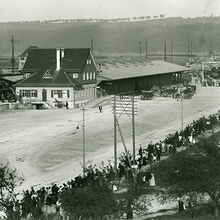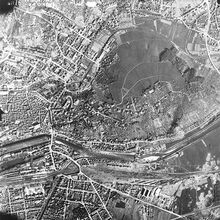Freight Depot: Prisoners of War and Forced Labor
Station im Stadtrundgang: History Path to National Socialism


The Tübingen freight depot was put into operation in 1913. During World War II, it was the most important hub for troops and military materiel in the region. From 1942 on, about 30 Soviet prisoners of war had to load and unload freight cars. Armed guards watched over the prisoners.
The 5.7 million Soviet prisoners of war in the German sphere of influence had to face threefold discrimination: as military enemies, as being "contaminated" by Bolshevism, and as Slav "Untermenschen" ("subhumans"). As a consequence, 3.3 million of them died in German "custody."
In Tübingen, Soviet prisoners of war had to work 60 hours per week on average. According to the Tübingen Ernährungsamt (food rationing office), their meat rations were to be preferably made up of horse and low-quality meat.
A female Tübingen resident remembered: "A train with Russian captives arrived; it was so horrible, I will never forget this as long as I live. They were barely able to walk; they were just skin and bones."
Because of its military importance, the freight depot became a target of Allied bombing raids. The heaviest raid took place on April 17, 1945, killing 25-year-old Michail Kusmin of Smolensk. Two days later, French troops liberated Tübingen.

